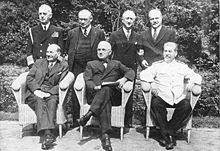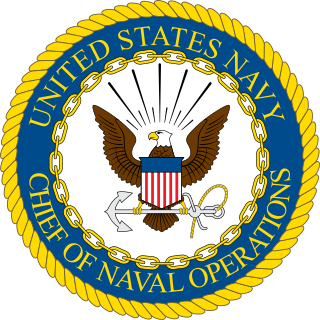
The chief of naval operations (CNO) is the highest-ranking officer of the United States Navy. The position is a statutory office held by an admiral who is a military adviser and deputy to the secretary of the Navy. The CNO is also a member of the Joint Chiefs of Staff and in this capacity, a military adviser to the National Security Council, the Homeland Security Council, the secretary of defense, and the president.

Chester William Nimitz was a fleet admiral in the United States Navy. He played a major role in the naval history of World War II as Commander in Chief, US Pacific Fleet, and Commander in Chief, Pacific Ocean Areas, commanding Allied air, land, and sea forces during World War II.

The Atlantic Charter was a statement issued on 14 August 1941 that set out American and British goals for the world after the end of World War II, months before the US officially entered the war. The joint statement, later dubbed the Atlantic Charter, outlined the aims of the United States and the United Kingdom for the postwar world as follows: no territorial aggrandizement, no territorial changes made against the wishes of the people (self-determination), restoration of self-government to those deprived of it, reduction of trade restrictions, global co-operation to secure better economic and social conditions for all, freedom from fear and want, freedom of the seas, abandonment of the use of force, and disarmament of aggressor nations. The charter's adherents signed the Declaration by United Nations on 1 January 1942, which was the basis for the modern United Nations.
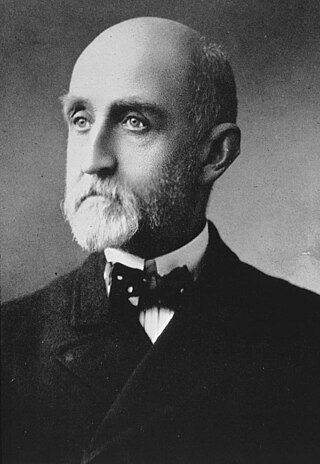
Alfred Thayer Mahan was a United States naval officer and historian, whom John Keegan called "the most important American strategist of the nineteenth century." His book The Influence of Sea Power Upon History, 1660–1783 (1890) won immediate recognition, especially in Europe, and with its successor, The Influence of Sea Power Upon the French Revolution and Empire, 1793–1812 (1892), made him world-famous.

Ernest Joseph King was a fleet admiral in the United States Navy who served as Commander in Chief, United States Fleet (COMINCH) and Chief of Naval Operations (CNO) during World War II. He directed the United States Navy's operations, planning, and administration and was a member of the Joint Chiefs of Staff and was the U.S. Navy's second-most senior officer in World War II after Fleet Admiral William D. Leahy, who served as Chairman of the Joint Chiefs of Staff.

William Daniel Leahy was an American naval officer. The most senior United States military officer on active duty during World War II, he held several titles and exercised considerable influence over foreign and military policy. As a fleet admiral, he was the first flag officer ever to hold a five-star rank in the U.S. Armed Forces.

The Combined Chiefs of Staff (CCS) was the supreme military staff for the United States and Britain during World War II. It set all the major policy decisions for the two nations, subject to the approvals of British Prime Minister Winston Churchill and U.S. President Franklin D. Roosevelt.

The Washington Naval Conference was a disarmament conference called by the United States and held in Washington, D.C., from November 12, 1921, to February 6, 1922. It was conducted outside the auspices of the League of Nations. It was attended by nine nations regarding interests in the Pacific Ocean and East Asia. Germany was not invited to the conference, as restrictions on its navy had already been set in the Versailles Treaty. Soviet Russia was also not invited to the conference. It was the first arms control conference in history, and is still studied by political scientists as a model for a successful disarmament movement.
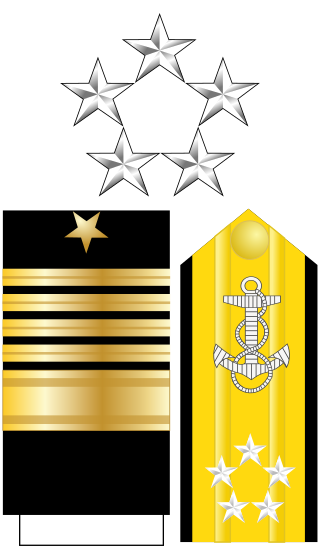
Fleet admiral is a five-star flag officer rank in the United States Navy whose rewards uniquely include active duty pay for life. Fleet admiral ranks immediately above admiral and is equivalent to General of the Army and General of the Air Force.

William Sowden Sims was an admiral in the United States Navy who fought during the late 19th and early 20th centuries to modernize the navy. During World War I, he commanded all United States naval forces operating in Europe. He also served twice as president of the Naval War College.
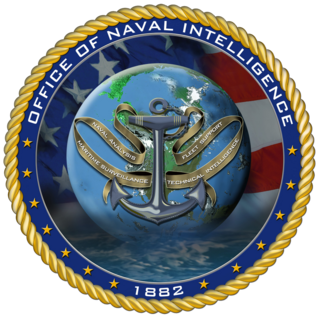
The Office of Naval Intelligence (ONI) is the military intelligence agency of the United States Navy. Established in 1882 primarily to advance the Navy's modernization efforts, it is the oldest member of the U.S. Intelligence Community and serves as the nation's premier source of maritime intelligence.
The First Washington Conference, also known as the Arcadia Conference, was held in Washington, D.C., from December 22, 1941, to January 14, 1942. President Roosevelt of the United States and Prime Minister Churchill of the United Kingdom attended the conference, where they discussed a future United Nations.
Naval strategy is the planning and conduct of war at sea, the naval equivalent of military strategy on land.

The Influence of Sea Power upon History: 1660–1783 is a history of naval warfare published in 1890 by the American naval officer and historian Alfred Thayer Mahan. It details the role of sea power during the seventeenth and eighteenth centuries, and discussed the various factors needed to support and achieve sea power, with emphasis on having the largest and most powerful fleet. Scholars considered it the single most influential book in naval strategy. Its policies were quickly adopted by most major navies, ultimately leading to the World War I naval arms race. It is also cited as one of the contributing factors of the United States becoming a great power.
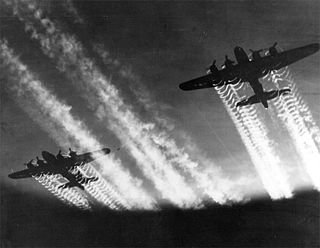
The military history of the United States during World War II covers the nation's role as one of the major Allies in their victory over the Axis Powers. The United States is generally considered to have entered the conflict with the 7 December 1941 surprise attack on Pearl Harbor by the Empire of Japan and exited it with the 2 September 1945 surrender of Japan. During the first two years of World War II, the US maintained formal neutrality, which was officially announced in the Quarantine Speech delivered by US President Franklin D. Roosevelt in 1937. While officially neutral, the US supplied Britain, the Soviet Union, and China with war materiel through the Lend-Lease Act signed into law on 11 March 1941, and deployed the US military to replace the British forces stationed in Iceland. Following the 4 September 1941 Greer incident involving a German submarine, Roosevelt publicly confirmed a "shoot on sight" order on 11 September, effectively declaring naval war on Germany and Italy in the Battle of the Atlantic. In the Pacific Theater, there was unofficial early US combat activity such as the Flying Tigers.

The scuttling of the French fleet at Toulon was orchestrated by Vichy France on 27 November 1942 to prevent Nazi German forces from seizing it. After the Allied invasion of North Africa, the Germans invaded the territory administered by Vichy under the Armistice of 1940. The Vichy Secretary of the Navy, Admiral François Darlan, defected to the Allies, who were gaining increasing support from servicemen and civilians. His replacement, Admiral Gabriel Auphan, guessed correctly that the Germans intended to seize the large fleet at Toulon, and ordered it scuttled.
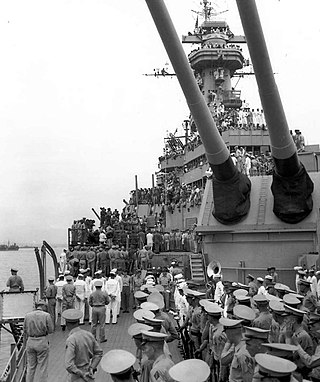
The United States Navy grew rapidly during its involvement in World War II from 1941–45, and played a central role in the Pacific War against Imperial Japan. It also assisted the British Royal Navy in the naval war against Nazi Germany and Fascist Italy. The U.S. Navy grew slowly in the years prior to World War II, due in part to international limitations on naval construction in the 1920s. Battleship production restarted in 1937, commencing with the USS North Carolina. The US Navy was able to add to its fleets during the early years of the war while the US was still neutral, increasing production of vessels both large and small, deploying a navy of nearly 350 major combatant ships by December 1941 and having an equal number under construction.
At the beginning of World War II, the Royal Navy was the strongest navy in the world, with the largest number of warships built and with naval bases across the globe. It had over 15 battleships and battlecruisers, 7 aircraft carriers, 66 cruisers, 164 destroyers and 66 submarines. With a massive merchant navy, about a third of the world total, it also dominated shipping. The Royal Navy fought in every theatre from the Atlantic, Mediterranean, freezing Northern routes to Russia and the Pacific ocean.

The third presidential term of Franklin D. Roosevelt began on January 20, 1941, when he was once again inaugurated as the 32nd president of the United States, and the fourth term of his presidency ended with his death on April 12, 1945. Roosevelt won a third term by defeating Republican nominee Wendell Willkie in the 1940 United States presidential election. He remains the only president to serve for more than two terms. Unlike his first two terms, Roosevelt's third and fourth terms were dominated by foreign policy concerns, as the United States became involved in World War II in December 1941.
The foreign policy of the United States was controlled personally by Franklin D. Roosevelt during his first and second and third and fourth terms as the president of the United States from 1933 to 1945. He depended heavily on Henry Morgenthau Jr., Sumner Welles, and Harry Hopkins. Meanwhile, Secretary of State Cordell Hull handled routine matters. Roosevelt was an internationalist, while powerful members of Congress favored more isolationist solutions in order to keep the U.S. out of European wars. There was considerable tension before the Attack on Pearl Harbor in December 1941. The attack converted the isolationists or made them irrelevant. The US began aid to the Soviet Union after Germany invaded it in June 1941. After the US declared war in December 1941, key decisions were made at the highest level by Roosevelt, Britain's Winston Churchill and the Soviet Union's Joseph Stalin, along with their top aides. After 1938 Washington's policy was to help China in its war against Japan, including cutting off money and oil to Japan. While isolationism was powerful regarding Europe, American public and elite opinion strongly opposed Japan.

